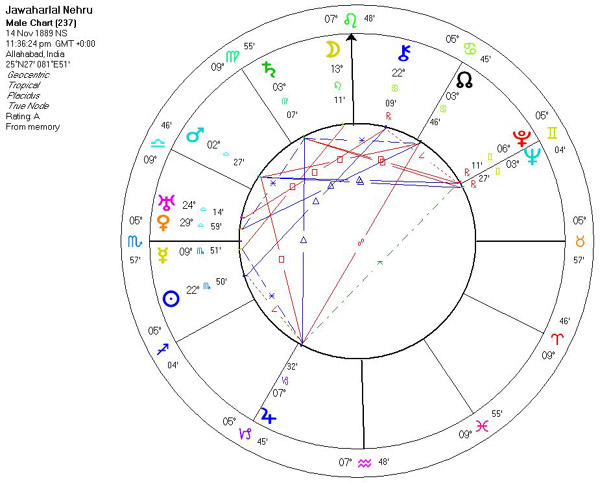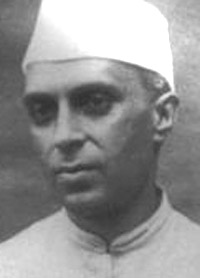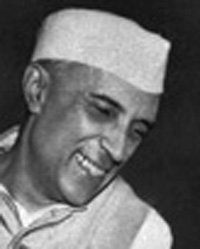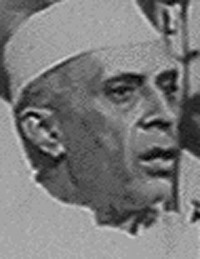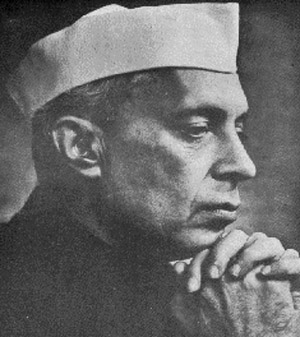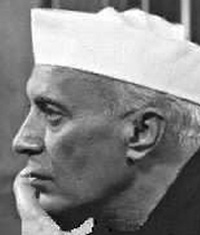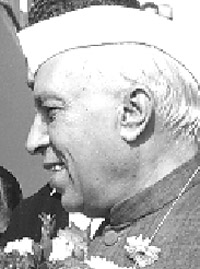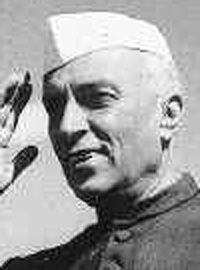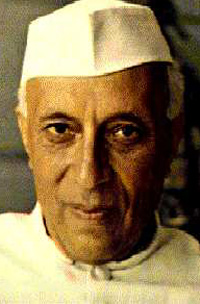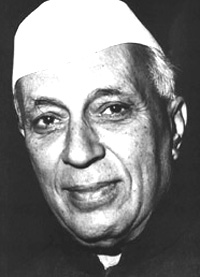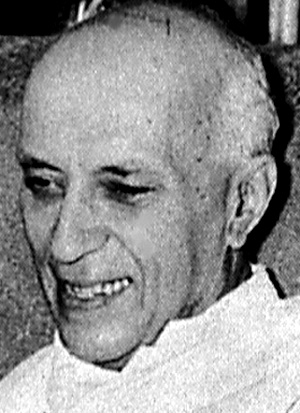Copyright Michael D. Robbins 2005
Astro-Rayological
Interpretation & Charts
Quotes
Biography
Images and Physiognomic Interpretation
A leader or a man of action in a crisis almost always acts subconsciously and then thinks of the reasons for his action.
A moment comes, which comes but rarely in history, when we step out from the old to the new; when an age ends; and when the soul of a nation long suppressed finds utterance.
Action itself, so long as I am convinced that it is right action, gives me satisfaction.
(Mars in Libra in 11th house)Action to be effective must be directed to clearly conceived ends.
(Mars in Libra trine Neptune & Pluto)Crises and deadlocks when they occur have at least this advantage, that they force us to think.
Culture is the widening of the mind and of the spirit.
Every little thing counts in a crisis.
(Saturn in Virgo)Great causes and little men go ill together.
Ignorance is always afraid of change.
It is only too easy to make suggestions and later try to escape the consequences of what we say.
(Mercury in Scorpio conjunct Ascendant)It is the habit of every aggressor nation to claim that it is acting on the defensive.
Life is like a game of cards. The hand you are dealt is determinism; the way you play it is free will.
Peace is not a relationship of nations. It is a condition of mind brought about by a serenity of soul. Lasting peace can come only to peaceful people.
The art of a people is a true mirror to their minds.
The person who runs away exposes himself to that very danger more than a person who sits quietly.
The policy of being too cautious is the greatest risk of all.
We live in a wonderful world that is full of beauty, charm and adventure. There is no end to the adventures that we can have if only we seek them with our eyes open.
What we really are matters more than what other people think of us. : Democracy is good. I say this because other systems are worse.
The only alternative to coexistence is codestruction.
I have become a queer mixture of the East and the West, out of place everywhere, at home nowhere.
ATTRIBUTION: On influence of his British education, recalled on his death 27 May 64I do not attach much importance to America's bombs. I attach importance to her great vitality and integrity. The strength of America is deeper and more significant than her financial power.
“Without peace, all other dreams vanish and are reduced to ashes.”
“Failure comes only when we forget our ideals and objectives and principles.”
“It is science alone that can solve the problems of hunger and poverty, of insanitation and illiteracy, of superstition and deadening of custom and tradition, of vast resources running to waste, or a rich country inhabited by starving poor... Who indeed could afford to ignore science today? At every turn we have to seek its aid... The future belongs to science and those who make friends with science.”
(Venus & Uranus conjunct Ascendant)“Time is not measured by the passing of years but by what one does, what one feels, and what one achieves.”
“I want nothing to do with any religion concerned with keeping the masses satisfied to live in hunger, filth, and ignorance. I want nothing to do with any order, religious or otherwise, which does not teach people that they are capable of becoming happier and more civilized on this earth, capable of becoming master of his fate and captain of his soul.”
“No country or people who are slaves to dogma and the dogmatic mentality can progress, and unhappily our country and people have become extraordinarily dogmatic and little-minded”
“Culture is the widening of the mind and of the spirit.”
“Citizenship consists in the service of the country”
“Democracy and socialism are means to an end, not the end itself.”
“The forces in a capitalist society, if left unchecked, tend to make the rich richer and the poor poorer.”
“Facts are facts and will not disappear on account of your likes”
“Obviously, the highest type of efficiency is that which can utilize existing material to the best advantage”
“The purely agitational attitude is not good enough for a detailed consideration of a subject”
“A theory must be tempered with reality.”
“Our chief defect is that we are more given to talking about things than to doing them”
“The person who talks most of his own virtue is often the least virtuous”
“Let us be a little humble; let us think that the truth may not perhaps be entirely with us”
“There is perhaps nothing so bad and so dangerous in life as fear.”
“Socialism is . . . not only a way of life, but a certain scientific approach to social and economic problems.”
“To be in good moral condition requires at least as much training as to be in good physical condition.”
“Loyal and efficient work in a great cause, even though it may not be immediately recognized, ultimately bears fruit”
“You don't change the course of history by turning the faces of portraits to the wall”
“The man who has gotten everything he wants is all in favor of peace and order.”
“What we need is a generation of peace.”
“Evil unchecked grows, evil tolerated poisons the whole system.”
“ At the stroke of the midnight hour, when the world sleeps, India will awake to life and freedom.”
“America is a country no one should go to for the first time”
“It is a fundamental rule of human life that, if the approach is good, the response is good”
“Those who are prepared to die for any cause are seldom defeated”
“India cannot sit on the fence anymore. It may have to make a choice. Either way it is going face problems,”
“A man who is afraid will do anything.”
“Its [Communism's] unfortunate association with violence encourages a certain evil tendency in human beings.”
“I think the years I have spent in prison have been the most formative and important in my life because of the discipline, the sensations, but chiefly the opportunity to think clearly, to try to understand things.”
(Venus & Uranus in Libra in 12th house)
Born 14 November 1889
Allahabad, Uttar Pradesh, India
Died May 27, 1964
Delhi, India
Political party Indian National Congress
Spouse Kamala Nehru
Religion Atheist; Hindu family background(November 14, 1889 – May 27, 1964) was a senior political leader of the Indian National Congress, was a pivotal figure during the Indian independence movement and served as the first Prime Minister of the Republic of India. Popularly referred to as Panditji (Scholar), Nehru was also a writer, scholar and amateur historian, and the patriarch of India's most influential political family.
As the son of the wealthy Indian barrister and politician Motilal Nehru, Nehru had become one of the youngest leaders of the Indian National Congress. Rising under the mentorship of Mahatma Gandhi, Nehru became a charismatic, radical leader, advocating complete independence from the British Empire. An icon for Indian youth, Nehru was also an exponent of socialism as a means to address long-standing national challenges. Serving as Congress President, Nehru raised the flag of independent India in Lahore on December 31, 1929. A forceful and charismatic orator, Nehru was a major influence in organising nationalist rebellions and spreading the popularity of the nationalist cause to India's minorities. Elected to lead free India's government, Nehru would serve as India's prime minister and head of the Congress till his death.
As India's leader, Nehru oversaw major national programmes of industrialization, agrarian and land reforms, infrastructure and energy development. He passionately worked for women's rights, secularism and advancement of education and social welfare. Nehru incepted the policy of non-alignment and developed India's foreign policy under the ideals of Pancasila. However, he was criticised for his failure of leadership during the Sino-Indian War in 1962. Later after his successor Lal Bahadur Shastri's demise ; Nehru's daughter Indira Gandhi would go on to lead the Congress and serve as prime minister, as would his grandson Rajiv. Rajiv's widow Sonia and her children lead the Congress today, maintaining the Nehru-Gandhi family's prominence in Indian politics.
Early life
Nehru at Harrow when he was 15.Jawaharlal Nehru was born in the city of Allahabad, situated along the banks of the Ganga River (now in the state of Uttar Pradesh). Jawahar means a "gem" in Arabic and is a name similar in meaning to moti, "pearl". He was the eldest child of Swarup Rani, the wife of wealthy barrister Motilal Nehru. The Nehru family descended from Kashmiri heritage and belonged to the Saraswat Brahmin caste of Hindus. Training as a lawyer, Motilal had moved to Allahabad and developed a successful practise and had become active in India's largest political party, the Indian National Congress. Nehru and his sisters — Vijaya Lakshmi and Krishna — lived in a large mansion called Anand Bhavan and were raised with English customs, mannerisms and dress. While learning Hindi and Sanskrit, the Nehru children would be trained to converse fluently and regularly in English.Jawaharlal and Kamala at their wedding.After being tutored at home and attending some of the most modern schools in India, Nehru would travel to England at the age of 15 to attend the Harrow School(The Head Master's House). He would proceed to study natural sciences at the Trinity College before choosing to train as a barrister at the Middle Temple in London. An average student, Nehru was attracted to the arts, culture and society of Western Europe and would pursue an active social life. Frequenting the theatres, museums and opera houses of London, he would spend his vacations travelling across Europe. Observers would later describe him as an elegant, charming young intellectual and socialite. Nehru would also participate actively in the political activities of the Indian student community, growing increasingly attracted to socialism and liberalism, which were beginning to influence the politics and economies of Europe.
Upon his return to India, Nehru's marriage was arranged with Kamala Kaul. Married on February 8, 1916 Nehru age was 27 and his bride was 16 years old. The first few years of their marriage were hampered by the cultural gulf between the anglicized Nehru and Kamala, who observed Hindu traditions and focused on family affairs. The following year Kamala would give birth to their only child, their daughter Indira Priyadarshini. Having made few attempts to establish himself in a legal practise, Nehru was immediately attracted to Indian political life, which at the time was emerging from divisions over World War I. The moderate and extremist factions of the Congress had reunited in its 1916 session in Lucknow, and Indian politicians had demanded Home Rule and dominion status for India. Joining the Congress under the patronage of his father, Nehru grew increasingly disillusioned with the liberal and anglicized nature of Congress politicians, which included his father. Although frequently hailed as a future leader of the Congress and India, Nehru's political rise did not begin until the arrival of Mahatma Gandhi on India's political
Young leader
Nehru was very strongly attracted to Gandhi's philosophy and leadership. Gandhi had led a successful rebellion on behalf of indentured Indian workers while a lawyer in South Africa. Upon his return to India, Gandhi organised the peasants and farmers of Champaran and Kheda in successful rebellions against oppressive tax policies levied by the British. Gandhi espoused what he termed as satyagraha — mass civil disobedience governed by ahimsa, or complete non-violence. A forceful exponent of Indian self-reliance, Gandhi's success electrified Indians, who had been divided in their approach to contesting British rule. Having met Gandhi and learning of his ideas, Nehru would assist him during the Champaran agitation.The family of Motilal Nehru, with Jawaharlal, his wife Kamala and daughter Indira.Following Gandhi's example, Nehru and his family abandoned their Western-style clothes, possessions and wealthy lifestyle. Wearing clothes spun out of khadi, Nehru would emerge as one of the most energetic supporters of Gandhi. Under Gandhi's influence, Nehru began studying the Bhagavad Gita and would practice yoga throughout his life. He would increasingly look to Gandhi for advice and guidance in his personal life, and would spend a lot of time travelling and living with Gandhi. Nehru travelled across India delivering political speeches aimed at recruiting India's masses, especially its youth into the agitation launched in 1919 against the Rowlatt Acts and the Khilafat struggle. He spoke passionately and forcefully to encourage Hindu-Muslim unity, spread education and self-reliance and the need to eradicate social evils such as untouchability, poverty, ignorance and unemployment.
Young Nehru.Emerging as a key orator and prominent organiser, Nehru became one of the most popular political leaders in northern India, especially with the people of the United Provinces, Bihar and the Central Provinces. His youth and passion for social justice and equality attracted India's Muslims, women and other minorities. Nehru's role grew especially important following the arrest of senior leaders such as Gandhi and his father, and he would also be imprisoned along with his mother and sisters for many months. Alarmed by growing violence in the conduct of mass agitations, Gandhi suspended the struggle after the killing of 22 policemen by a nationalist mob at Chauri Chaura on February 4, 1922. This sudden move disillusioned many nationalists, including Nehru's father Motilal, who would join the newly formed Swaraj Party in 1923. However, Nehru remained loyal to Gandhi and publicly supported him.
A lull in nationalist activities enabled Nehru to turn his attention to social causes and local government. In 1924, he was elected president of the municipal corporation of Allahabad, serving as the city's chief executive for two years. Nehru would launch ambitious schemes to promote education, sanitation, expand water and electricity supply and reduce unemployment — his ideas and experience would prove valuable to him when he assumed charge of India's government in 1947. Achieving some success, Nehru was dissatisfied and angered by the perceived obstruction of British officials and corruption amongst civil servants. He would resign from his position within two years.
In the early part of the decade, his marriage and family life had suffered owing to the constant activity on his part and that of his father. Although facing domestic pressures and tensions in the absence of her husband, Kamala would increasingly travel with Nehru, address public meetings and seek to sponsor and encourage nationalist activities in her hometown. In the late 1920s, the initial marital gulf between the two disappeared and the couple would grow closer to each other and their daughter. In 1926 Nehru took his wife and daughter to Europe so that Kamala could receive specialist medical care. The family travelled and lived in England, Switzerland, France and Germany. Continuing his political work, Nehru would be deeply impressed by the rising currents of radical socialism in Europe, and would deliver fervent speeches in condemnation of imperialism. On a visit to the Soviet Union, Nehru was favourably impressed by the command economy, but grew critical of Stalin's totalitarianism.
Rise to national leadership
in the 1920s.In the 1920s, Nehru was elected president of the All India Trade Unions Congress. He and Subhash Chandra Bose had become the most prominent youth leaders, and both demanded outright political independence of India. Nehru criticised the Nehru Report prepared by his father in 1928, which called for dominion status for India within the British Empire. The radicalism of Nehru and Bose would provoke intense debates during the 1928 Congress session in Guwahati. Arguing that India would deliver an ultimatum to the British and prepare for mass struggle, Nehru and Bose won the hearts of many young Indians. To resolve the issue, Gandhi said that the British would be given two years to grant India dominion status. If they did not, the Congress would launch a national struggle for full political independence. Nehru and Bose succeeded in reducing the statutory deadline to one year.The failure of talks with the British caused the December 1929 session in Lahore to be held in an atmosphere charged with nationalist, anti-British passions. Preparing for the declaration of independence, the AICC elected Jawaharlal Nehru as Congress President at the encouragement of Gandhi. Favoured by Gandhi for his charismatic appeal to India's masses, minorities, women and youth, the move nevertheless surprised many Congressmen and political observers. Many had demanded that Gandhi or the leader of the Bardoli Satyagraha, Vallabhbhai Patel assume the presidency, especially as the leader of the Congress would the inaugurater of India's struggle for complete freedom. Nehru was seen by many as too inexperienced for the job of leading India's largest political organisation, including himself:
"I have seldom felt quite so annoyed and humiliated... It was not that I was not sensible of the honour... But I did not come to it by the main entrance or even the side entrance: I appeared suddenly from a trap door and bewildered the audience into acceptance."
On December 31, 1929 President Nehru hoisted the flag of independence before a massive public gathering along the banks of the Ravi River. The Congress would promulgate the Purna Swaraj (Complete Independence) declaration on January 26, 1930. With the launching of the Salt Satyagraha in 1930, Nehru travelled across Gujarat and other parts of the country participating and encouraging in the mass rebellion against the salt tax. Despite his father's death in 1931, Nehru and his family remained at the forefront of the struggle. Arrested with his wife and sisters, Nehru would be incarcerated for all but four months between 1931 and 1935.
Avadi and Quit India
Nehru and Gandhi at the 1942 Congress in Mumbai.With Kamala Nehru's health increasingly fragile, Nehru was released by the British and he travelled with his family once again to Europe in 1935, where Kamala would remain bed-ridden. Torn between the freedom struggle and tending to his wife, Nehru would travel back and forth between India and Europe, and despite the care given by him, his daughter Indira and specialist doctors, Kamala Nehru died in 1938. Deeply saddened, Nehru nevertheless continued to maintain a hectic schedule. He would always wear a fresh rose in his coat for the remainder of his life to remember Kamala, who had also become a national heroine.Nehru had been re-elected Congress President in 1936, and had presided over its session in Lucknow. Here he participated in a fierce debate with Gandhi, Patel and other Congress leaders over the adoption of socialism as the official goal of the party. Younger socialists such as Jaya Prakash Narayan, Mridula Sarabhai, Narendra Dev and Asoka Mehta began to see Nehru as leader of Congress socialists. Under their pressure, the Congress passed the Avadi Resolution proclaiming socialism as the model for India's future government. Nehru was re-elected the following year, and oversaw the Congress national campaign for the 1937 elections. Largely leaving political organisation work to others, Nehru travelled the length and breadth of the country, exhorting the masses on behalf of the Congress, which would win an outright majority in the central and most of the provincial legislatures. Although he did not contest elections himself, Nehru was seen by the national media as the leader of the Congress.
sitting next to Mahatma Gandhi at the AICC General Session, 1942At the outbreak of World War II, India was entered on the side of the British by the viceroy. Outraged at the viceroy's arbitrary decision, all elected Congressmen resigned from their offices at the instigation of Subhash Bose and Nehru. But even as Bose would call for an outright revolt and would proceed to seek the aid of Nazi Germany and Japan, Nehru remained sympathetic to the British cause. He joined Maulana Azad, Chakravarthi Rajagopalachari and Patel in offering Congress support for the war effort in turn for a commitment from the British to grant independence after the war. In doing so, Nehru broke ranks with Gandhi, who had resisted in supporting war and remained suspicious of the British. The failure of negotiations and Britain's refusal to concede independence outraged Indian nationalists. Gandhi and Patel called for an all-out rebellion, a demand that was opposed by Rajagopalachari and resisted by Nehru and Azad. After intensive debates and heated discussions, the Congress leaders called for the British to Quit India — to transfer power to Indian hands immediately or face a mass rebellion. Despite his skepticism, Nehru travelled the country to exhort India's masses into rebellion. He was arrested with the entire Congress Working Committee on August 9, 1942 and transported to a maximum security prison at a fort in Ahmednagar. Here he would remain incarcerated with his colleagues till June 1945. His daughter Indira and her husband Feroze Gandhi would also be imprisoned for a few months. Nehru's first grandchild, Rajiv was born in 1944.
] Responses to Gandhi
Nehru speaks highly of Gandhi throughout his life. In the passage below, he speaks about the Salt March that Gandhi organized in order to try to get the British out of the colony of India. Below, in an excerpt from his autobiograhpy, Nehru speaks about his respect for Gandhi and his salt march.It seemed as though a spring had been suddendly released; and all over the country in town and village, salt manufacture was the topic of the day. We knew precious little about it, and so we read it up where we could, and issued leaflets giving directions, and collected pots and pans and ultimately succeeded in producing some unwholesome stuff, which we waved about in triumph. It was really immaterial whether the stuff was good or bad; the main thing was to commit a breach of the obnoxious salt law. As we saw the abounding enthusiasm of the people and the way salt-making was spreading like a prairie fire, we felt a little abashed and ashamed for having questioned the efficacy of this method when it was first proposed by Gandhi. And we marveled at the amazing knack of the man to impress the multitude and make it act in an organized way.
India's first prime minister
Maulana Azad and Nehru.Nehru and his colleagues had been released as the British Cabinet Mission arrived to propose plans for transfer of power. The Congress held a presidential election in the knowledge that its chosen leader would become India's head of government. 11 Congress state units nominated Vallabhbhai Patel, while only the Working Committee suggested Nehru. Sensing that Nehru would not accept second place to Patel, Gandhi supported Nehru and asked Patel to withdraw, which he immediately did. Nehru's election surprised many Congressmen and continues to be a source of controversy in modern times. Nehru headed an interim government, which was impaired by outbreaks of communal violence and political disorder, and the opposition of the Muslim League led by Muhammad Ali Jinnah, who were demanding a separate Muslim state of Pakistan. After failed bids to form coalitions, Nehru reluctantly supported the partition of India as per a plan released by the British on June 3, 1947. He would take office as the Prime Minister of India on August 15, and delivered his inaugural address titled "A Tryst With Destiny:""Long years ago we made a tryst with destiny, and now the time comes when we shall redeem our pledge, not wholly or in full measure, but very substantially. At the stroke of the midnight hour, when the world sleeps, India will awake to life and freedom. A moment comes, which comes but rarely in history, when we step out from the old to the new, when an age ends, and when the soul of a nation, long suppressed, finds utterance. It is fitting that at this solemn moment we take the pledge of dedication to the service of India and her people and to the still larger cause of humanity."]
However, this period was marked with intense communal violence that swept across the Punjab region, Delhi, Bengal and other parts of India. Nehru conducted joint tours [citation needed] with Pakistani leaders to encourage peace and calm angry and disillusioned refugees. Nehru would work with Maulana Azad and other Muslim leaders to safeguard and encourage Muslims to remain in India. The violence of the time deeply affected Nehru, who called for a ceasefire [citation needed] and UN intervention to stop the Indo-Pakistani War of 1947. Fearing communal reprisals, Nehru also hesitated in supporting the annexation of Hyderabad State, and clashed with Patel on the Kashmir dispute and relations with Pakistan. Nehru asserted his own control over Kashmir policy while Patel objected to Nehru sidelining his Home Ministry's officials.[2] Nehru felt offended by Patel's decision-making regarding the states' integration without consulting either him or the Cabinet. Patel asked Gandhi to relieve him of his obligation to serve. He knew that he lacked Nehru's youth and popularity, and believed that an open political battle would hurt India. After much personal deliberation and contrary to Patel's prediction, Gandhi on January 30, 1948 told Patel not to leave the Government, and to stay by Nehru's side in joint leadership. A free India, according to Gandhi, desperately needed both Patel and Nehru's joint leadership.[3]
Nehru and Gandhi.Gandhi was assassinated on January 30, 1948. At Gandhi's wake, Nehru and Patel embraced each other and addressed the nation together. Criticism soon arose from the media and other politicians that Patel's home ministry had failed to protect Gandhi. Emotionally exhausted, Patel tendered a letter of resignation, offering to leave the Government — despite his word to Gandhi — desiring not to embarrass Nehru's administration. Nehru sent Patel a letter dismissing any question of personal differences and his desire for Patel's ouster. He reminded Patel of their thirty-year partnership in the freedom struggle, and that after Gandhi's death, it was especially wrong for them to quarrel. Moved, Patel personally and publicly endorsed Nehru's leadership and refuted any suggestion of discord. Despite working together, the two leaders would clash on various issues. Nehru declined Patel's counsel on sending assistance to Tibet after its 1950 invasion by the People's Republic of China and ejecting the Portuguese from Goa by military force.[4]
When Nehru pressured Dr. Rajendra Prasad to decline a nomination to become the first President of India in 1950 in favour of Rajagopalachari, he thus angered the party, which felt Nehru was attempting to impose his will. Nehru sought Patel's help in winning the party over, but Patel declined, and Prasad was duly elected. When Nehru opposed the 1950 Congress presidential candidacy of Purushottam Das Tandon, a conservative Hindu leader, he endorsed Jivatram Kripalani and threatened to resign if Tandon was elected. Patel rejected Nehru's views and endorsed Tandon in Gujarat, where Kripalani received not one vote despite hailing from that state himself.[5] Patel believed Nehru had to understand that his will was not law with the Congress, but he personally discouraged Nehru from resigning after the latter felt that the party had no confidence in him.[6]
Leading India
In the years following independence, Nehru frequently turned to his daughter Indira to look after him and manage his personal affairs. Following Patel's death in 1950, Nehru became the most popular and powerful Indian politician. Under his leadership, the Congress won an overwhelming majority in the elections of 1952, in which his son-in-law Feroze Gandhi was also elected. Indira moved into Nehru's official residence to attend to him, inadvertently estranging her husband, who would become a critic of Nehru's government. Nevertheless, Indira would virtually become Nehru's chief of staff and constant companion in his travels across India and the world.Economic policies
Nehru implemented his socialist vision by introducing a diluted version of state planning and control over the economy. Creating the Planning commission of India, Nehru drew up the first Five-Year Plan in 1951, which charted the government's investments in industries and agriculture. Increasing business and income taxes, Nehru envisaged a mixed economy in which the government would manage strategic industries such as mining, electricity and heavy industries, serving public interest and a check to private enterprise. Nehru pursued land redistribution and launched programmes to build irrigation canals, dams and spread the use of fertilizers to increase agricultural production. He also pioneered a series of community development programs aimed at spreading diverse cottage industries and increasing efficiency into rural India. While encouraging the construction of large dams, irrigation works and the generation of hydroelectricity, Nehru also launched India's programme to harness nuclear energy.For most of Nehru's term as prime minister, India would continue to face serious food shortages despite progress and increases in agricultural production. The nation would rely on food imports and economic development aid from the World Bank, IMF, the United States and European nations. Nehru's industrial policies encouraged the growth of diverse manufacturing and heavy industries, yet state planning, controls and regulations impaired productivity, quality and profitability. Although the Indian economy enjoyed a steady rate of growth, chronic unemployment amidst entrenched poverty continued to plague the population. Nehru's popularity remained unaffected, and his government succeeded in extending water and electricity supply, health care, roads and infrastructure to a large degree for India's vast rural population.
A few of Nehru's ministers had to resign on allegation of corruption .His minister of Mines and Oil K D Malviya had to resign for accepting money from a private party in return for certain concessions. The sitting judge of the Supreme Court, S.K. Das reviewed all the evidence, including the account books of the businessman in which mention had been made of a payment to Malviya, and found two of the six charges against the Minister to be valid. Malviya resigned as a result. [3]
Another minister T. T. Krishnamachari had to resign when one man Justice Chagla Commission found him guilty of corruption .[4]
Education and social reform
Nehru distributing sweets to children in Guwahati.Jawaharlal Nehru was a passionate advocate of education for India's children and youth, believing it essential for India's future progress. His government oversaw the establishment of many institutions of higher learning, including the All India Institute of Medical Sciences, the Indian Institutes of Technology and the Indian Institutes of Management. Nehru also outlined a commitment in his five-year plans to guarantee free and compulsory primary education to all of India's children. For this purpose, Nehru oversaw the creation of mass village enrollment programmes and the construction of thousands of schools. Nehru also launched initiatives such as the provision of free milk and meals to children in order to fight malnutrition. Adult education centres, vocational and technical schools were also organised for adults, especially in the rural areas.Under Nehru, the Indian Parliament enacted many changes to Hindu law to criminalize caste discrimination and increase the legal rights and social freedoms of women. A system of reservations in government services and educational institutions was created to eradicate the social inequalities and disadvantages faced by peoples of the scheduled castes and scheduled tribes. Nehru also championed secularism and religious harmony, increasing the representation of minorities in government.
National security and foreign policy
talks to Pakistan prime minister Muhammad Ali Bogra during his 1953 visit to Karachi.Although having promised in 1948 to hold a plebiscite in Kashmir under the auspices of the U.N., Nehru grew increasingly wary of the U.N. and declined to hold a plebiscite in 1953. He ordered the arrest of the Kashmiri politician Sheikh Abdullah, whom he had previously supported but now suspected of harbouring separatist ambitions; Bakshi Ghulam Mohammad replaced him. On the international scene, Nehru was a champion of pacifism and a strong supporter of the United Nations. He pioneered the policy of non-alignment and co-founded the Non-Aligned Movement of nations professing neutrality between the rival blocs of nations led by the U.S. and the U.S.S.R. Recognising the People's Republic of China, Nehru sought to establish warm and friendly relations with it despite the annexation of Tibet in 1950, and hoped to act as an intermediary to bridge the gulf and tensions between the communist states and the Western bloc.While hailed by many for working to defuse global tensions and the threat of nuclear weapons, Nehru's neutrality was always suspect and assailed by many politicians and governments when he refused to condemn the Soviet invasion of Hungary in 1956 in the same vein he had criticised the joint invasion of the Suez Canal by the British, French and Israelis. Suspicion and distrust cooled relations between India and the U.S., which suspected Nehru of tactily supporting the Soviet Union. Nehru was also criticised for underallocation of funds and resources for India's military services, even as the U.S. provided extensive military aid to Pakistan. Accepting the arbitration of the UK and World Bank, Nehru signed the Indus Water Treaty in 1960 with Pakistani ruler Ayub Khan to resolve long-standing disputes about sharing the resources of the major rivers of the Punjab region.
Final years
Public viewing of Nehru's body, which lies in state.Nehru had led the Congress to a major victory in the 1957 elections, but his government was facing rising problems and criticism. Disillusioned by intra-party corruption and bickering, Nehru contemplated resigning but continued to serve. However, Nehru's reputation suffered owing to corruption scandals of party MPs and ministers, as well as by public dissatisfaction with a stagnating economy and government inefficiency. The election of his daughter Indira as Congress President in 1959 aroused criticism for alleged nepotism. Although the Pancha Sila (Five Principles of Peaceful Coexistence) was the basis of the 1954 Sino-Indian treaty over Tibet, in later years, Nehru's foreign policy suffered through increasing Chinese antagonism over border disputes and Nehru's decision to grant asylum to the Dalai Lama. After years of failed negotiations, Nehru authorized the Indian Army to annex Goa from Portugal in 1961. While increasing his popularity, Nehru received criticism for opting for military action.In the 1962 elections, Nehru led the Congress to victory yet with a diminished majority. Opposition parties ranging from the right-wing Bharatiya Jana Sangh and Swatantra Party, socialists and the Communist Party of India performed well. In a matter of months, a Chinese invasion of northeastern India exposed the weaknesses of India's military as Chinese forces came as far as Assam. Widely criticised for neglecting India's defence needs, Nehru was forced to sack the defence minister Krishna Menon and accept U.S. military aid. Nehru's health began declining steadily, and he was forced to spend months recuperating in Kashmir through 1963. Upon his return from Kashmir in May 1964, Nehru suffered a stroke and later a heart attack. He died in the early hours of May 27, 1964. Nehru was cremated as per Hindu rites at the Shantivana on the banks of the Yamuna River, witnessed by hundreds of thousands of mourners who had flocked into the streets of Delhi and the cremation grounds.
Jawaharlal Nehru Biography
Born: November 14, 1889
Died: May 27, 1964
Achievements: Took active part in Non-Cooperation Movement; elected President of the Allahabad Municipal Corporation in 1924, and served for two years as the city's chief executive; Presided over Congress' annual session in Lahore in 1929 and passed a resolution demanding India's independence; elected as Congress President in 1936, 1937, and 1946; became first Prime Minister of independent India; was one of the main architects of Non Aligned Movement.Jawaharlal Nehru, also known as Pandit Jawaharlal Nehru, was one of the foremost leaders of Indian freedom struggle. He was the favourite disciple of Mahatma Gandhi and later on went on to become the first Prime Minister of India. Jawahar Lal Nehru is widely regarded as the architect of modern India. He was very fond of children and children used to affectionately call him Chacha Nehru.
Jawahar Lal Nehru was born on November 14, 1889. His father Motilal Nehru was a famous Allahabad based barrister. Jawaharlal Nehru's mother's name was Swaroop Rani. Jawaharlal Nehru was the only son of Motilal Nehru. Motilal Nehru has three daughters apart from Jawaharlal Nehru. Nehrus were Saraswat Brahmin of Kashmiri lineage.
Jawaharlal Nehru received education in some of the finest schools and universities of the world. He did his schooling from Harrow and completed his Law degree from Trinity College, Cambridge. The seven years he spent in England widened his horizons and he acquired a rational and skeptical outlook and sampled Fabian socialism and Irish nationalism, which added to his own patriotic dedication.
Jawaharlal Nehru returned to India in 1912 and started legal practice. He married Kamala Nehru in 1916. Jawahar Lal Nehru joined Home Rule League in 1917. His real initiation into politics came two years later when he came in contact with Mahatma Gandhi in 1919. At that time Mahatma Gandhi had launched a campaign against Rowlatt Act. Nehru was instantly attracted to Gandhi's commitment for active but peaceful, civil disobedience. Gandhi himself saw promise and India's future in the young Jawaharlal Nehru.
Nehru family changed its family according to Mahatma Gandhi's teachings. Jawaharlal and Motilal Nehru abandoned western clothes and tastes for expensive possessions and pastimes. They now wore a Khadi Kurta and Gandhi cap. Jawaharlal Nehru took active part in the Non- Cooperation Movement 1920-1922) and was arrested for the first time during the movement. He was released after few months.
Jawaharlal Nehru was elected President of the Allahabad Municipal Corporation in 1924, and served for two years as the city's chief executive. This proved to be a valuable administrative experience for stood him in good stead later on when he became the prime minister of the country. He used his tenure to expand public education, health care and sanitation. He resigned in 1926 citing lack of cooperation from civil servants and obstruction from British authorities.
From 1926 to 1928, Jawaharlal served as the General Secretary of the All India Congress Committee. In 1928-29, the Congress's annual session under President Motilal Nehru was held. During that session Jawaharlal Nehru and Subhas Chandra Bose backed a call for full political independence, while Motilal Nehru and others wanted dominion status within the British Empire. To resolve the point, Gandhi said that the British would be given two years to grant India dominion status. If they did not, the Congress would launch a national struggle for full, political independence. Nehru and Bose reduced the time of opportunity to one year. The British did not respond.
In December 1929, Congress's annual session was held in Lahore and Jawaharlal Nehru was elected as the President of the Congress Party. During that sessions a resolution demanding India's independence was passed and on January 26, 1930 in Lahore, Jawaharlal Nehru unfurled free India's flag. Gandhiji gave a call for Civil Disobedience Movement in 1930. The movement was a great success and forced British Government to acknowledge the need for major political reforms.
When the British promulgated the Government of India Act 1935, the Congress Party decided to contest elections. Nehru stayed out of the elections, but campaigned vigorously nationwide for the party. The Congress formed governments in almost every province, and won the largest number of seats in the Central Assembly. Nehru was elected to the Congress presidency in 1936, 1937, and 1946, and came to occupy a position in the nationalist movement second only to that of Gandhi. Jawaharlal Nehru was arrested in 1942 during Quit India Movement. Released in 1945, he took a leading part in the negotiations that culminated in the emergence of the dominions of India and Pakistan in August 1947.
In 1947, he became the first Prime Minister of independent India. He effectively coped with the formidable challenges of those times: the disorders and mass exodus of minorities across the new border with Pakistan, the integration of 500-odd princely states into the Indian Union, the framing of a new constitution, and the establishment of the political and administrative infrastructure for a parliamentary democracy.
Jawaharlal Nehru played a key role in building modern India. He set up a Planning Commission, encouraged development of science and technology, and launched three successive five-year plans. His policies led to a sizable growth in agricultural and industrial production. Nehru also played a major role in developing independent India's foreign policy. He called for liquidation of colonialism in Asia and Africa and along with Tito and Nasser, was one of the chief architects of the nonaligned movement. He played a constructive, mediatory role in bringing the Korean War to an end and in resolving other international crises, such as those over the Suez Canal and the Congo, offering India's services for conciliation and international policing. He contributed behind the scenes toward the solution of several other explosive issues, such as those of West Berlin, Austria, and Laos.
But Jawahar Lal Nehru couldn't improve India's relations with Pakistan and China. The Kashmir issue proved a stumbling block in reaching an accord with Pakistan, and the border dispute prevented a resolution with China. The Chinese invasion in 1962, which Nehru failed to anticipate, came as a great blow to him and probably hastened his death. Jawaharlal Nehru died of a heart attack on May 27, 1964.
